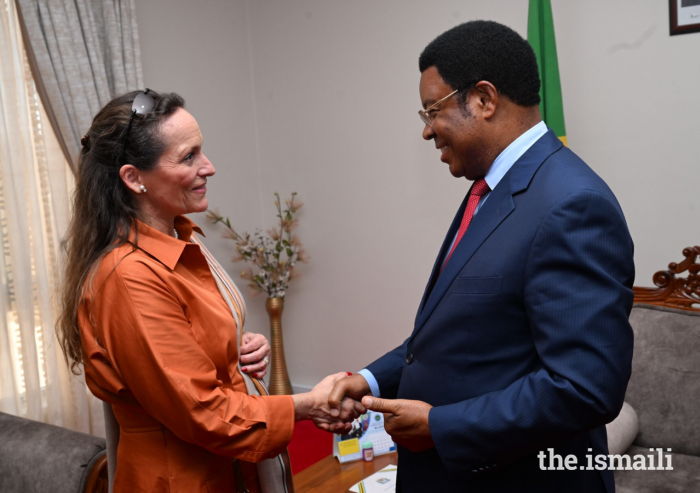Through various curated online learning programmes, AKEPB India is encouraging teachers from across the country to connect, learn, and develop new skill sets in their field. These initiatives have prompted many teachers in the Jamat to kickstart their own entrepreneurial ventures, helping them improve their quality of life, even in these challenging times.
“This is a very good time to learn something new in a formal way,” said Anjum, a preschool teacher and centre-head at Ivy International School in Warangal, a city in Southern India’s Telangana state. Since the beginning of India’s nation-wide lockdown in March, Anjum hoped to upgrade her skills and learn new pedagogies that could improve her practice as a teacher in the space of early childhood development (ECD). AKEPB India helped her to tap into programmes to build these skill sets.
In the early stages of the lockdown, AKEPB India launched a series of initiatives to help teachers of the Jamat learn new skills that were critical to navigating the changing nature of jobs and work. With a focus on online education, these initiatives virtually connected teachers across the country to help them learn, develop stellar skill sets, and kickstart their own entrepreneurial ventures.
It all began with a webinar to introduce young teachers to the world of online teaching. Over 400 teachers from across the country joined and demonstrated a keen interest in tapping into the financial potential of the ed-tech space. Since then, AKEPB India has organised several follow-up webinars to make teachers aware of emerging and rewarding opportunities in the online teaching space.
"Covid-19 has been a game changer for India’s ed-tech sector, opening up meaningful opportunities for people across the value chain,” said Aly Jagmagia, National Honorary Secretary for AKEPB India. Citing a research report by RedSeer & Omdiyar Network, Aly pointed out how online education offerings in India are projected to increase significantly. “At EPB, we are extremely excited about this and believe this is a megatrend that Jamati teachers, entrepreneurs, and job seekers can leverage."
The results of these recent programmes, though small to start, are evident. More than 10 teachers have been placed with ed-tech platforms such as Whitehat Jr, Vedantu, and Stone2milestones, and have all seen a significant jump in their incomes.
The institution believes that these results will only scale up further, as the programmes grow in size and capacity. While AKEPB India’s initial focus was on training and job placements for teachers on ed-tech platforms, a separate set of programmes have also supported teachers with entrepreneurial ambitions.
For example, a recently launched phonetics programme helped teachers learn the valuable skill of teaching phonics, which are indispensable to children in the early years of their language development. Run by Inara and Karim Velji, the co-founders of a Pune-based Montessori school called iCube, the virtual training programme was structured as a five-day online course. More than 80 participants from across the country, interested in the area of early childhood education, participated in this programme in two consecutive batches.
While the course lasted only five days, the impact that it had on the participants’ skill sets was far more profound.
“I got to learn so many things, like short vowels and long vowels,” said Afreen Lakhani, a preschool teacher at Fountainhead School, Surat. “Even though I had experience teaching phonics for a year, the programme really helped me to build on my learnings.”
Another pre-school teacher, Anjum, provided further insights into how the programme has helped her to promote the holistic language development of kids right from home.
“It’s like a triple-fold gain: personal gain, gain for the parents I work with, and a gain for the teachers I work with,” she shared.
However, the scope of the impact of this phonetics course was not just limited to learning new skills and improving the teachers’ job prospects. The facilitators engaged with the participants even after the course formally ended to support them in planning their own entrepreneurial ventures. Through the sustained guidance of the facilitators, Afreen has been able to start her own phonetics coaching classes for children online. Speaking about how these classes have opened up another source of income.
While Afreen shared the early impact of her entrepreneurial venture, Anjum shared her plan for the future.
“I am not only using the skills I learnt in these sessions in my job, but I am also thinking of having a parent education programme for phonetic development,” she said.
From Surat to Junagadh, the programme has helped nurture entrepreneurial aspirations in the teaching community. For example, Kinjal Kotadiya, a teacher from Junagadh, started her own Facebook page, “KK Phonetics,” and is all set to launch phonics classes not only for children but also for elderly members of our Jamat who want to learn English.
Apart from this initiative, AKEPB India has also been introducing various certification programmes to help teachers learn new transferable skills that can help with employability and job readiness. One such initiative is the Early Childhood Care and Education (ECCE) programme, which aims to provide teachers with a deeper understanding of concepts in ECD and equip them with skills to promote a child’s holistic development. Led by Inara Velji, the programme currently has 24 teachers enrolled.
“It’s a foundation course for those interested in this field of early childhood development and education,” said Inara. Reflecting on the economic opportunity in ECD, she explained, “There are a lot of options. You can go into counselling, teaching, start your own day care centre, become a subject teacher, or even start your own tuition classes. So this foundation course will open up so many opportunities for those who participate.”
These initiatives have helped teachers in the Jamat to find pockets of opportunity amidst the crisis so that they can adapt to a rapidly-changing economic environment. They are a testament to the fact that constraints can catalyse positive change, and that continuing education is a potent response to the challenges of our times. By investing in teachers, AKEPB India is continuing a time-honoured tradition of investing in education and lifelong learning as transformational tools to improve the quality of life of the Jamat and wider society.








